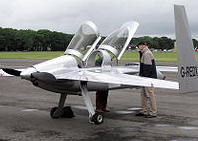
ABOVE: Berkut 360 kit plane
The Bureau of Industry and Security (“BIS”) released a final order today denying export privileges to Ali Asghar Manzarpour for twenty years. The denial order is premised on allegations by BIS that Manzarpour attempted to export a single-engine aircraft to Iran on April 28, 2004, by exporting it to the U.K. and then ordering a freight forwarding company to re-export it to Iran.
Manzarpour never responded to BIS’s Charging Letter, and so a default order was entered by the BIS Administrative Law Judge. Most of the ALJ’s decision dealt with which one of the various attempts by BIS to serve the charging letter was sufficient to support a default order. Ultimately the ALJ relied on a registered letter sent to an alternate address for Manzarpour in Brighton, England, that was returned as “refused.”
The BIS documents don’t tell much about the considerably more interesting story of Mr. Manzapour’s export of the single-engine aircraft, but at least part of that story can be found in other sources, including a BBC radio interview with Mr. Manzarpour. The saga began when Polish authorities detained Mr. Manzarpour on February 17, 2005, based on the export of the aircraft from the U.S and at the request of Immigration and Customs Enforcement. Mr. Manzarpour was immediately placed in Polish custody pending an extradition motion from the U.S. On February 24, 2005, a grand jury in the District of Columbia indicted Manzarpour for violating the U.S. sanctions imposed on Iran.
According to the BBC interview with Manzarpour, the aircraft involved was a Berkut 360 kit plane — i.e., a small aircraft sold unassembled to aviation enthusiasts. (The U.S. asserts that these planes can be easily converted to military unmanned aircraft). Manzarpour also says that he obtained a license from the U.K. Export Control Organisation authorizing the export.
In all events, after Mr. Manzapour spent 22 months in a Polish prison, the Polish appeals court denied the U.S. request for extradition, apparently on the basis that the export of the Berkut 360 wasn’t a crime under Polish law. As a result, Mr. Manzarpour was, in December 2006, returned to the U.K.
Thereafter, in July 2007, after the U.S failed in its effort to bring Manzarpour to the U.S. for criminal prosecution, BIS issued the charging letter that led to the denial of Manzarpour’s export privileges. That’s what should have been done in the first place rather than wasting U.S. resources in a futile attempt to prosecute a foreign national for violation of unilateral U.S. sanctions on foreign soil.
 Permalink
Permalink
Copyright © 2008 Clif Burns. All Rights Reserved.
(No republication, syndication or use permitted without my consent.)

 Posted by
Posted by  Category:
Category: 

